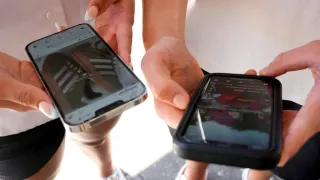August 12, 2017
Team Seeks LGBTs for National Health Study
Matthew S. Bajko READ TIME: 4 MIN.
A team of health researchers based in San Francisco has been selected by the National Institutes of Health to encourage participation in a groundbreaking federal health study by sexual and gender minorities from across the country.
Known as the All of Us Research Program, the study aims to enroll 1 million Americans who will be tracked by researchers for at least a decade. Participants will be asked myriad questions about where they live, their health, family, and work.
The All of Us study is currently in beta testing mode and is expected to fully launch by 2018. As of now, only people 18 years of age or older are eligible to participate. A key demographic that researchers are targeting for the study is the LGBT community.
To facilitate outreach to LGBT individuals throughout the country, NIH recently awarded the San Francisco General Hospital Foundation a $1.6 million grant over three years. In addition to encouraging sexual and gender minorities to join the study, the foundation team is also tasked with providing input on enrollment materials and research plans, developing customized educational programs and studying best practices in the dissemination of research results to support retention.
"This is an ambitious and large project that is different in thinking about diseases," said Dr. Kirsten Bibbins-Domingo, director of the UCSF Center for Vulnerable Populations and the university's vice dean for population health and health equity. "We are really pleased that a commitment to understanding the health of LGBT communities is going to be an important part of this unique study."
Through the wealth of information collected from the All of Us study, health officials hope to discern patterns that contribute to people's well-being and chances of becoming sick due to a variety of factors, whether it is their personal habits or where they live. The study is part of NIH's Precision Medicine Initiative, begun under President Barack Obama, that considers a person's genes, environment and lifestyle in developing individualized disease prevention and treatment plans.
"It turns research on its head," said Bibbins-Domingo, who is straight and one of the All of Us project principal investigators. "We want participants engaged in the study itself, not just get their blood drawn but help define what the research questions are. We want not just the numbers but engagement."
Her center is based at Zuckerberg San Francisco General Hospital, where she also works as a general internist. She has teamed with Dr. Mitchell Lunn, the co-director of the Pride Study, a longitudinal study of LGBT people and an assistant professor of medicine in the division of nephrology (kidney disease) at UCSF, on the LGBT outreach for the All of Us study.
Lunn, a gay cisgender male, is also involved with PRIDEnet, the community engagement arm for the Pride Study that includes more than 40 partner organizations around the country, including health organizations, community centers, and national organizations that support or serve sexual and gender minority people.
He suspects the work PRIDEnet is already engaged in gave the foundation team an edge with their application to oversee the All of Us study's LGBT recruitment efforts.
While there is no set target for how many LGBT people NIH would like to see participate in the All of US study, Lunn told the Bay Area Reporter that the bare minimum he would like to see is 40,000 LGBT people. With the country's LGBT population estimated to be 4 percent, Lunn said it is fair to want to see a similar percentage of the 1 million people in the All of Us study be sexual and gender minorities.
"The title of the study is All of Us. They are taking a very community-engaged approach to make sure it really does represent everybody and not just well-to-do white folks who are more typical to take part in health studies," said Lunn.
The focus on recruiting LGBT people for the new federal study comes amid a flurry of efforts at the local, state, and national levels to ensure sexual orientation and gender identity (SOGI) questions are included in not just health studies but all manner of government forms and surveys, as the Bay Area Reporter noted in a recent three-part series about LGBT data collection efforts.
The NIH has been in the forefront on the issue. Last October it designated sexual health minorities a health disparities population, opening the door for more research into the LGBT community's health risk factors. Lunn said he doesn't expect to see that commitment change, despite recent moves by the Trump administration to remove SOGI questions from federal surveys.
He noted that the president had reappointed NIH Director Dr. Francis Collins and that the director of the agency's Office of Extramural Research, Dr. Michael Lauer, remains in place.
"Francis Collins has a demonstrated track record of being supportive of LGBT people and including them in NIH research," said Lunn.
The federal agency's decision to include LGBT people from the beginning of the All of Us study, and seek their input on its development, "is historic," noted Lunn.
"It is a very historic time for LGBT people in this country," he said. "This is really the first time LGBT people are being involved in the design, development and implementation of an incredibly ambitious and large federal health study."
To learn more about the All of Us Research Program, visit https://www.joinallofus.org






